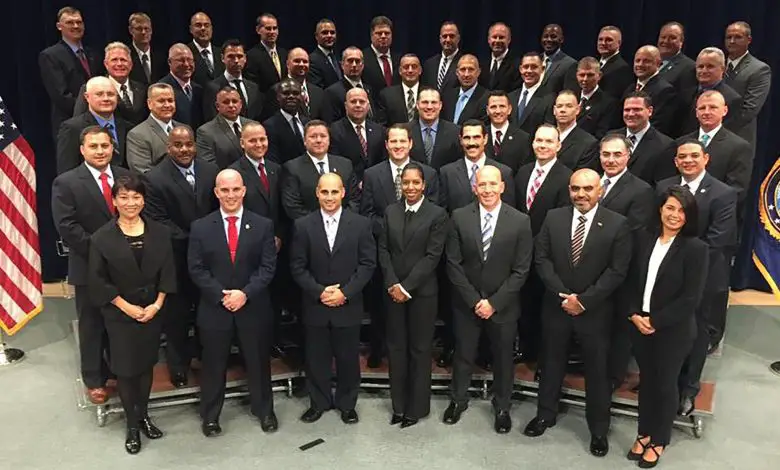Exploring the Role of an FBI Special Agent !
Requirements, Selection Process, and Career Insights.

Law enforcement on a federal level demands a unique breed of professionals—enter the FBI Special Agent. These individuals are the backbone of the Federal Bureau of Investigation’s (FBI) efforts to combat a wide array of federal crimes. From cyber threats to organized crime, their work extends to tackling complex challenges that jeopardize national security. In this comprehensive guide, we delve into the world of FBI Special Agents, from their responsibilities and qualifications to the rigorous selection process and the competencies that set them apart. If you’re curious about the inner workings of the FBI’s elite agents and the path to joining their ranks, read on for valuable insights.
Key Takeaways
- FBI Special Agent Role: FBI Special Agents are responsible for investigating federal criminal law violations related to national security threats, including terrorism, cybercrime, espionage, public corruption, white-collar crime, and organized and violent crime.
- Qualifications: Becoming an FBI Special Agent requires being a U.S. citizen, having a bachelor’s degree, meeting age requirements, possessing work experience, holding a valid driver’s license, passing physical fitness tests, and obtaining a Top Secret SCI clearance.
- SASS Process: The Special Agents Selection System (SASS) is the multi-step selection process used by the FBI to identify suitable candidates. It involves application submission, tests, interviews, background investigations, physical fitness assessments, and training.
- Core Competencies: FBI evaluates candidates based on core competencies including collaboration, communication, flexibility, initiative, interpersonal skills, leadership, planning and organization, and judgment and problem-solving.
- Benefits: FBI Special Agents enjoy competitive salaries, benefits like health insurance, 401K plans, paid time off, opportunities for international assignments, relocation benefits, and specialized training.
What Is an FBI Special Agent?
An FBI Special Agent is a highly trained law enforcement officer responsible for investigating federal criminal law violations. Operating under the umbrella of the U.S. Department of Justice, these agents are an integral part of the Federal Bureau of Investigation (FBI). With a broad mandate, FBI special agents address a range of national security threats, including terrorism, cybercrime, espionage, public corruption, white-collar crime, and organized and violent crime.
The Daily Tasks of an FBI Special Agent
The responsibilities of an FBI special agent encompass a diverse array of tasks aimed at maintaining national security and upholding the rule of law. These tasks include:
- Gathering Evidence: Collecting crucial evidence to build strong cases against criminals.
- Investigating Data Theft and Violent Crimes: Probing into data breaches and violent criminal activities.
- Examining Business Records: Scrutinizing business records to uncover financial irregularities.
- Safeguarding Valuable Assets: Ensuring the security of valuable weapons and technology.
- Identifying Organized Crime Groups: Identifying and dismantling organized crime networks.
- Interrogating Suspects and Witnesses: Questioning suspects and witnesses to extract vital information.
- Monitoring Suspects: Keeping a close watch on individuals involved in suspicious activities.
- Undercover Operations: Infiltrating criminal organizations to gather insider information.
- Arresting Criminals: Apprehending individuals proven to be involved in criminal activities.
- Testifying in Court: Providing testimony as a witness in legal proceedings.
Minimum Qualifications to Become an FBI Special Agent
To be considered for the highly competitive role of an FBI special agent, candidates must meet certain minimum qualifications, including:
- U.S. Citizenship: Being a citizen of the United States.
- Age Requirement: Being at least 23 years old but younger than 36 at the time of application.
- Education and Experience: Possessing a bachelor’s degree and a minimum of two years of full-time work experience.
- Driver’s License: Holding a valid driver’s license.
- Physical Fitness: Meeting the FBI’s physical fitness requirements.
- Security Clearance: Obtaining the FBI’s Top Secret Sensitive Compartmented Information (SCI) clearance.
The Path to Becoming an FBI Special Agent: The SASS Process
The Special Agents Selection System (SASS) is the comprehensive selection process that the FBI uses to identify suitable candidates for the special agent role. The SASS process involves several key stages:
- Application Submission: Candidates begin by completing a federal application form on the FBI careers page. Alongside the application, a federal resume and college transcript must be provided. Additional documentation may be required for government employees and veterans.
- FBI Phase I Test: This computerized exam evaluates various skills necessary for a special agent role, including figural reasoning, logic-based reasoning, preferences, personality assessment, and situational judgment.
- Meet and Greet Interview: An in-person review of the application and verification of provided information, conducted at a local processing field office.
- Pass the Phase II Test: This test includes a writing assessment and a structured interview, assessing the candidate’s suitability for the role.
- Receive a Conditional Appointment Offer: Successful completion of Phase II qualifies candidates for a conditional appointment, subject to further evaluation.
- Undergo a Background Investigation: This thorough investigation involves various checks and verifications, including a polygraph exam, personnel security interview, fingerprinting, drug tests, and more.
- Pass the Physical Fitness Test (PFT): Candidates must meet physical fitness standards, including sit-ups, sprinting, push-ups, and a timed run.
- Basic Field Training Course (BFTC): This training equips aspiring agents with foundational knowledge in areas like defensive tactics, interrogation, human intelligence, and firearms.
- Career Placement: Upon completing the BFTC, candidates are officially designated as FBI special agents and assigned to one of the 56 field offices across the U.S.
Core Competencies Evaluated During the Selection Process
Throughout the SASS process, the FBI evaluates candidates based on key core competencies that are essential for success in the role of an FBI special agent. These competencies include:
- Collaboration: The ability to work effectively within a team and share accurate information.
- Communication: Skills in listening, analyzing, interpreting, and conveying information clearly and persuasively.
- Flexibility and Adaptability: Readiness to respond to new situations and challenges.
- Initiative: Proactive approach and willingness to develop new skills.
- Interpersonal Skills: Building rapport, managing conflicts, and interacting positively with colleagues.
- Leadership Skills: Ability to guide investigations, set direction, and mentor others.
- Planning and Organization: Skill in prioritizing tasks and developing effective strategies.
- Judgment and Problem-Solving: Analyzing situations, making data-driven decisions, and managing risks.
FBI Special Agent Salary and Benefits
- Salary Range: FBI special agents earn annual salaries between $78,000 and $153,000, with supervisory special agents potentially earning up to $170,000. These figures reflect a substantial premium over the national average.
- Benefits: Special agents enjoy a range of benefits, including a robust 401K plan, health insurance coverage, and paid time off. They may also have opportunities for international assignments, relocation benefits, and specialized training programs. Furthermore, special agents can apply for student loan forgiveness programs.
For those seeking a dynamic and impactful career in law enforcement, becoming an FBI special agent offers a challenging yet rewarding path. The rigorous selection process ensures that individuals chosen for this role possess the necessary skills and attributes to uphold national security and combat federal criminal violations effectively.
FAQ about FBI Special Agents
1. How does the FBI select candidates for the special agent role?
The FBI employs a rigorous selection process known as the Special Agents Selection System (SASS). This multi-step process evaluates candidates based on various skills and competencies required for the special agent role. It includes phases like application submission, Phase I and Phase II tests, meet-and-greet interviews, background investigations, physical fitness tests, and specialized training. The goal is to ensure that selected candidates possess the necessary qualifications, physical fitness, and attributes to effectively carry out the responsibilities of an FBI special agent.
2. What are the main responsibilities of an FBI special agent?
FBI special agents are responsible for investigating federal criminal law violations with a focus on national security threats. These threats encompass a wide range of activities, including terrorism, cybercrime, espionage, public corruption, white-collar crime, and organized and violent crime. Special agents gather evidence, interrogate suspects and witnesses, conduct surveillance, infiltrate criminal organizations, and more. Their efforts play a crucial role in maintaining national security and upholding the rule of law.
3. What qualifications are necessary to become an FBI special agent?
To become an FBI special agent, candidates need to meet several minimum qualifications. These include being a U.S. citizen, being between the ages of 23 and 36, having a bachelor’s degree and at least two years of full-time work experience, possessing a valid driver’s license, meeting physical fitness requirements, and obtaining a Top Secret Sensitive Compartmented Information (SCI) clearance. These qualifications ensure that candidates have the educational background, experience, and character necessary for the demanding role of an FBI special agent.
4. What is the significance of the SASS process in the FBI hiring procedure?
The Special Agents Selection System (SASS) is a critical part of the FBI’s hiring procedure for special agents. It’s designed to identify candidates who possess the right skills, attributes, and qualifications for the challenging role. SASS includes various stages such as tests, interviews, background checks, physical fitness assessments, and training. This comprehensive process ensures that only the most suitable candidates progress through each stage, ultimately resulting in the selection of individuals who can successfully fulfill the responsibilities of an FBI special agent.
5. How do core competencies contribute to the selection of FBI special agents?
The FBI evaluates candidates based on a set of core competencies that reflect the soft skills required for success as an FBI special agent. These competencies include collaboration, communication, flexibility, initiative, interpersonal skills, leadership, planning and organization, and judgment and problem-solving. Throughout the selection process, candidates are assessed on their ability to demonstrate these competencies, as they are crucial for effective teamwork, decision-making, communication, and adaptability in the complex and dynamic field of law enforcement.
6. What is the role of physical fitness in the selection process for FBI special agents?
Physical fitness is an essential aspect of the selection process for FBI special agents. The nature of the job demands that agents maintain a high level of physical readiness to handle a variety of situations, including apprehending suspects, conducting physical surveillance, and responding to emergencies. Candidates are required to pass the Physical Fitness Test (PFT), which assesses their fitness level through various exercises such as sit-ups, sprinting, push-ups, and a timed run. This ensures that special agents can effectively perform their duties and respond to the demands of the job.
7. What benefits and advantages do FBI special agents enjoy?
FBI special agents receive competitive compensation, with annual salaries ranging from $78,000 to $153,000, and supervisory special agents potentially earning up to $170,000. These salaries reflect a significant premium over the national average and reward the demanding and impactful nature of the role. Special agents also enjoy a range of benefits, including a substantial 401K plan, health insurance coverage, and paid time off. Additionally, they have opportunities for international assignments, relocation benefits, specialized training programs, and even eligibility for student loan forgiveness.
8. How does the FBI ensure diversity in its pool of special agent candidates?
Diversity is a priority for the FBI, and the organization is committed to building a workforce that reflects the diverse communities it serves. To ensure diversity in its pool of special agent candidates, the FBI employs various outreach initiatives and partnerships with diverse organizations. The agency actively seeks candidates from different backgrounds, experiences, and demographics. This commitment to diversity not only enhances the effectiveness of the FBI’s operations but also fosters a more inclusive and representative law enforcement agency.
9. Can FBI special agents work in various capacities within the organization?
Absolutely. FBI special agents have the opportunity to specialize and work in various units and capacities within the organization. They can focus on areas such as cybercrime, counterterrorism, organized crime, public corruption, and more. Additionally, agents may pursue leadership roles as they advance in their careers, taking on responsibilities that involve directing investigations, leading teams, and contributing to the strategic direction of the agency’s operations.
10. What challenges do FBI special agents face in their day-to-day work?
FBI special agents face several challenges in their day-to-day work. The nature of their responsibilities, which often involve investigating complex and high-stakes cases, requires them to adapt quickly to changing situations and make critical decisions under pressure. Additionally, the need for discretion and confidentiality, along with the potential risks associated with confronting criminals, can lead to a demanding and sometimes stressful work environment. However, the training, support, and sense of purpose that come with the role help agents navigate these challenges and make meaningful contributions to national security and law enforcement.
Conclusion
Becoming an FBI Special Agent is a journey that demands dedication, resilience, and a commitment to upholding the highest standards of law enforcement. It’s not just a career; it’s a calling to protect the nation from a diverse range of threats. The road to becoming an FBI Special Agent is paved with challenges that assess not only your skills but also your character and adaptability. From the stringent selection process to the core competencies evaluated, the FBI seeks individuals who can thrive in the dynamic and often demanding landscape of federal law enforcement. By meeting the rigorous requirements, successfully navigating the SASS process, and embodying the essential competencies, you can embark on a rewarding path as an FBI Special Agent. If you’re ready to step into the shoes of those who safeguard the nation’s security, the journey starts here.













